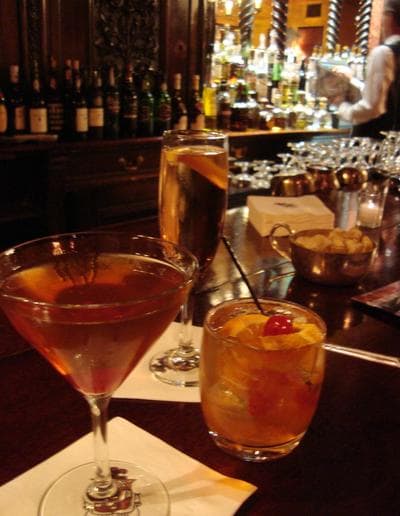Advertisement
Food Critic: Locke-Ober 'Was Stepping Into Another Era'
ResumeIt wasn't the oldest restaurant in Boston, but it was close.
Locke-Ober opened its doors in Downtown Crossing in 1875 and for more than a century it was the place for power lunches in the city. It was elegant, genteel and soaked in history and tradition. It served steaks and martinis and lobster stew to presidents and movie stars and hot-shot businessmen. And this weekend, Locke-Ober closed for good, a victim of declining business and changing times.
WBUR All Things Considered host Sacha Pfeiffer spoke with Corby Kummer, the restaurant critic for Boston magazine and a senior editor at The Atlantic magazine, about the restaurant's place in the city's history.
Sacha Pfeiffer: For listeners who had never been to Locke-Ober, or who hadn't been there in years, could you describe the place for us? Walking in there was like stepping back in time.
Well, you just took the words right out of my mouth! It was stepping into another era, that era being the 1890s through the 1950s, the time when deals were cut in backrooms, when the people at the State House, which was just a 10-minute walk away, would come down, have their cigars — probably their humidors with their cigars — waiting for them, their steaks, their lobster Savannah, and would feel surrounded only by people as powerful and deal-cutting as they.

And it had the most beautiful silver, gleaming silver. The mahogany bar, which was magnificently ornate. There was ceremony, there was deference, there were men waiting on you in black aprons and white shirts.
And who ate there?
It was Boston's power brokers and it was members of the club that kind of ran Boston. The Boston politicians, mostly Irish, who would cut deals, would also go there. John F. Kennedy was a regular.
Restaurants come, restaurants go. It's simply part of the nature of the business. What is lost with Locke-Ober going away?
What's lost is a beautiful interior that gives you a chance to see how people lived and displayed their power and money. So it's a chance to revisit old haunts, to look at a beautiful ornate interior. That is lost. As for a place where you can meet, where you can see people you want to make deals with, that isn't lost because the power establishment has moved elsewhere.
And what I would argue is — and what I argued in my most recent Boston magazine review when I said it was wheezing into its eighth of nine lives and was "on life support" and I wondered whether this patient deserved to survive — is that most people in that power crowd now, their lunch date is a BlackBerry or an iPhone.
Right — it's not a three-martini lunch.
It's definitely not a three-martini lunch, if they even actually leave the office to meet for lunch. Locke-Ober had to re-imagine itself for new times to survive, and I think it unfortunately it failed to re-imagine itself.
It tried to. In brought in big-name Boston chef and restaurant owner Lydia Shire about a decade ago to freshen up the interior and the menu. But in many ways it stayed the same; it always had that formality, that menu that was definitely not for people on a diet.
Well, Lydia was a classicist. She was helping bring it in a new era where women were recognized as power brokers, as they very much are in Boston today, even though there weren't very many women servers, and what she presided over was a beautiful refurbishment: that silver gleamed, the gilt leaf burnished and was magnificent again. It wasn't 10 years later, after a series of yet more business reversals, which went on throughout its history.
Locke-Ober was steeped in history, for better and for worse. There were many things about the place that were not progressive. Would you tell us about that side of the restaurant?
Aside from the food, which was absolutely full of butter and cholesterol, it was ridiculously overpriced. It was very expensive for what it was. But what bothered me most when I re-reviewed it last year — and I wanted to like it, because I love historical places — was the lack of diversity I noted. It just seemed really conspicuous among the waitstaff and the clientele, and I thought: They aren't keeping up with the times and they need to attract more people.
And I think it wasn't even until the 1970s that women could eat there.
Yes, and I think that they were sort of kept out of sight in upstairs private dining rooms, of which there were many, but not allowed in the bar until then.
It sounds like although you appreciated what this place was, you felt that it was time for it to go.
I don't know that I felt that it was time for it to go because that magnificent bar downstairs should never go, and everyone who comes to Boston should have a chance to go in there. But it can thrive and flourish as a really democratic place that invites in the new generation of power brokers, the new people who want to make deals, the new people who just want to meet after work for a drink in the most splendid surroundings possible.
This program aired on October 22, 2012.
